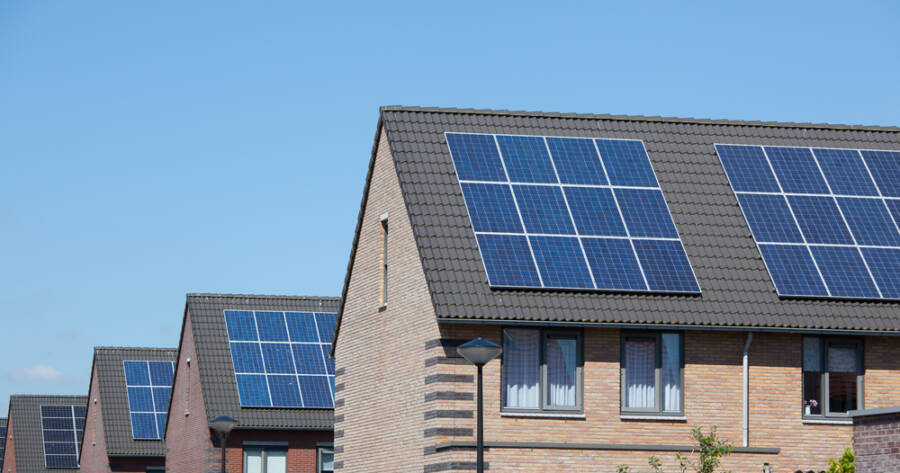As energy prices soar, homeowners are seeking effective strategies to cut costs. While you might think solar panels are pricey, solar programs can make them affordable. Explore no-fee solar programs to help you reduce your energy bills and carbon footprint.
Understanding Solar Panels
Solar panels harness sunlight and convert it into electrical energy through a process known as photovoltaics (PV). This occurs when sunlight activates the electrons in the solar cells, generating electricity that can power your household, thus reducing dependency on conventional energy sources. 1
How No-Fee Solar Programs Work
No-fee solar programs offer a way to install solar panels at little or no upfront cost. Instead of paying for the panels outright, homeowners typically sign an agreement with a solar provider. The provider installs and maintains the panels, and the homeowner pays for the electricity generated by the system.
In some cases, homeowners may enter into a lease or power purchase agreement (PPA). Under a lease, you pay a fixed monthly fee for using the solar energy system. With a PPA, you pay only for the electricity you use, often at a lower rate than the local utility charges. Both options allow you to benefit from solar power without the initial financial investment.
The Benefits of Solar Programs
The biggest advantage of no-fee solar programs is the savings. By using solar power, you can lower your electricity bills immediately, with no large payments required upfront. Over time, these savings can add up significantly, helping to offset the costs of energy consumption.
Another key benefit is the environmental impact. 2 Solar energy is renewable and produces no harmful emissions. By switching to solar, you reduce your carbon footprint, helping to fight climate change. Additionally, the solar provider handles maintenance, so you don’t need to worry about repairs or replacements.
Finally, many of these programs come with warranties, ensuring that your solar panels are covered in case of any issues. This offers peace of mind and a hassle-free way to enjoy the benefits of solar energy.
Frequently Asked Questions
Prospective solar panel users often have questions regarding their investment. Here are a few that come up frequently:
What’s the lifespan of solar panels?
Solar panels have a lifespan of 25 to 30 years, though they can continue to produce electricity beyond this time at a slightly reduced capacity. 3
Can solar panels generate electricity on overcast days?
Solar panels are capable of generating electricity even on cloudy days, albeit at lower efficiency. 4
Is extensive maintenance required for solar panels?
Solar panels require minimal upkeep, with occasional inspections and cleaning recommended to maintain peak performance. 5
Things to Consider Before Joining a Solar Program
While no-fee solar programs offer many benefits, there are a few things to consider before signing up. First, make sure to read the contract carefully. Some agreements may last 20 to 25 years, so it’s essential to understand the terms before committing.
Second, check how much you’ll save. While these programs can lower your electricity costs, savings can vary based on factors like your energy usage, location, and the specific terms of the agreement. It’s a good idea to compare offers from different providers to find the best deal.
Lastly, remember that solar panels can increase your home’s value. However, if you don’t own the system outright (as is the case with most no-fee programs), this might affect your ability to sell the home. Potential buyers will need to assume the solar agreement, which could be a sticking point for some.
Is Solar Power Right for You?
No-fee solar programs are a fantastic way to make the switch to solar energy without breaking the bank. However, it’s important to assess whether solar is the right choice for your home. Solar panels work best in areas with a lot of sunlight. Homes with shade from trees or buildings may not generate enough energy to make the program worthwhile.
Also, consider how long you plan to stay in your home. Since most solar agreements last for decades, you’ll want to ensure you’ll be able to enjoy the benefits of the program for as long as possible.
Explore More Solar Programs
No-fee solar programs unlock a world of savings for homeowners, making solar power more accessible and affordable. By eliminating upfront costs and offering long-term savings, these programs provide a low-risk way to switch to clean energy.
While there are important factors to consider, like contract terms and potential home resale challenges, the benefits often outweigh the drawbacks. If you’re ready to reduce your electric bills and make a positive environmental impact, exploring a no-fee solar program might be the perfect solution for you.




